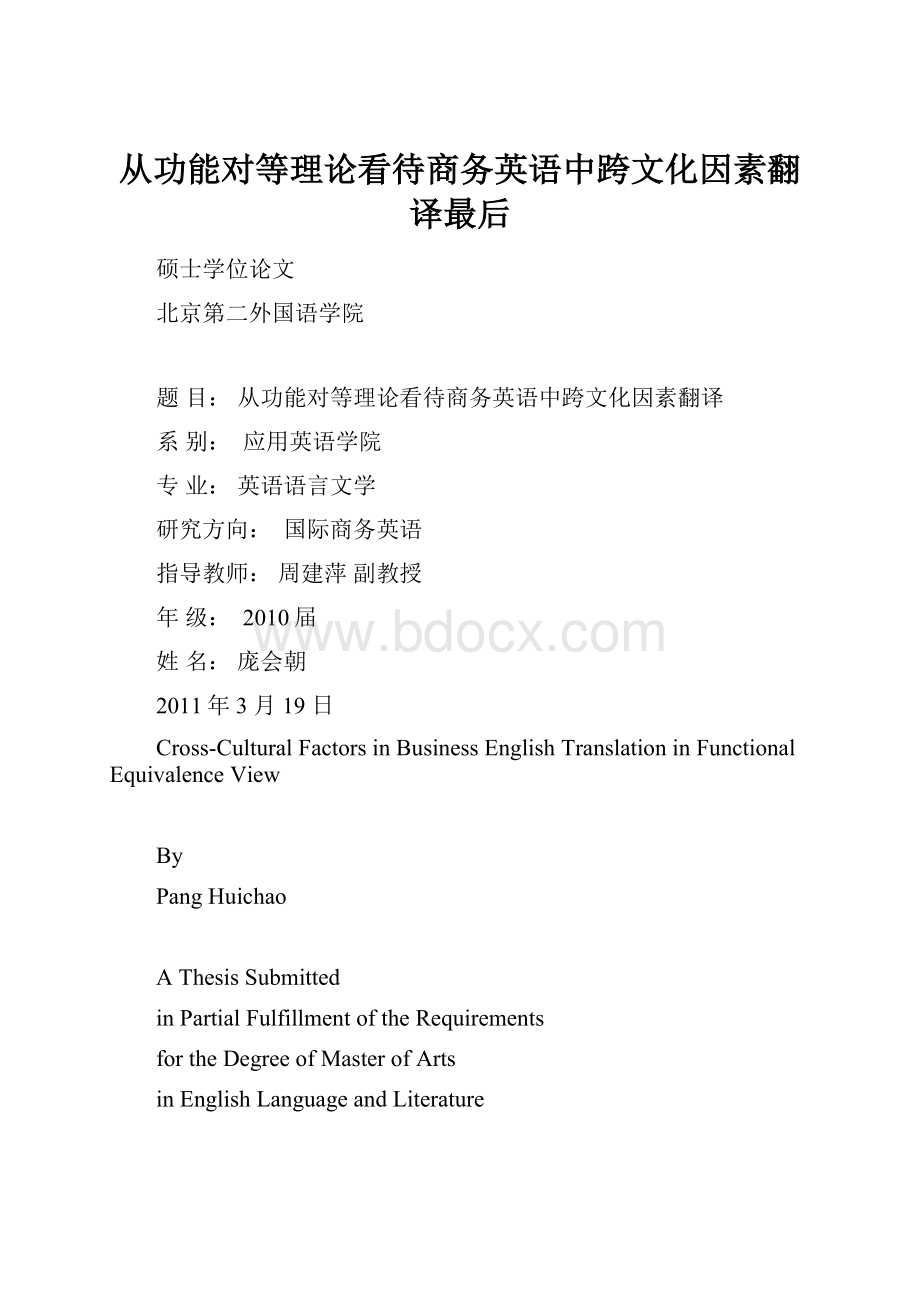从功能对等理论看待商务英语中跨文化因素翻译最后.docx
《从功能对等理论看待商务英语中跨文化因素翻译最后.docx》由会员分享,可在线阅读,更多相关《从功能对等理论看待商务英语中跨文化因素翻译最后.docx(44页珍藏版)》请在冰豆网上搜索。

从功能对等理论看待商务英语中跨文化因素翻译最后
硕士学位论文
北京第二外国语学院
题目:
从功能对等理论看待商务英语中跨文化因素翻译
系别:
应用英语学院
专业:
英语语言文学
研究方向:
国际商务英语
指导教师:
周建萍副教授
年级:
2010届
姓名:
庞会朝
2011年3月19日
Cross-CulturalFactorsinBusinessEnglishTranslationinFunctionalEquivalenceView
By
PangHuichao
AThesisSubmitted
inPartialFulfillmentoftheRequirements
fortheDegreeofMasterofArts
inEnglishLanguageandLiterature
SupervisedbyProfessorZhouJianping
InstituteofLinguisticsandAppliedLinguistics
BeijingInternationalStudiesUniversity
Beijing
March2011
北京第二外国语学院学位论文写作声明和使用授权说明
学位论文写作声明
本人郑重声明:
所呈交的学位论文(论文题目:
),是本人在导师的指导下,独立进行研究工作所取得的成果。
除文中已经注明引用的内容外,本论文不含任何其他个人或集体已经发表或撰写过的作品或成果。
对本文的研究做出重要贡献的个人和集体,均已在文中以明确方式标明。
本声明的法律结果由本人承担。
论文作者签名:
日期:
年月日
学位论文使用授权说明
本人(姓名)_______学号________所呈交的论文(论文题目:
)完全了解北京第二外国语学院关于收集、保存、使用学位论文的规定,即:
按照学校要求提交学位论文的印刷本和电子版本;学校有权保存学位论文的印刷本和电子版,并提供目录检索与阅览服务;学校可以采用影印、缩印、数字化或其它复制手段保存论文;在不以赢利为目的的前提下,学校可以将学位论文编入有关数据库,提供网上服务。
(保密论文在解密后遵守此规定)
论文作者签名:
导师签名:
日期:
年月日
中文摘要
随着经济全球化和中国改革开放的迅速发展,人与人之间的商务沟通愈加深广。
作为全球商务沟通的工作语言,商务英语在业内已引起了人们的重视。
语言是文化的具体体现。
在商务沟通中,信息的有效交换取决于翻译。
在翻译中,除了掌握必要的翻译技巧和语言知识,还要了解熟悉该语言中的文化,尤其是其中的跨文化因素。
故翻译者要在翻译过程中兼顾两种文化,尽可能使译文既贴近外国文化,又同时保留本国文化的文化意境。
奈达提出了两种对等:
形式对等和功能对等。
从功能对等的视角看,翻译强调的是源语言与目标语言的接受者对于信息反应的对等。
从跨文化交际的角度讲,除了信息本身,人们对于所传达信息的反应还取决于信息传递者与接受者所处的文化。
文化影响信息传递,因而影响语言间的翻译。
商务英语的翻译不仅仅是两种语言互相交换,也是两种文化的传递。
文化语境的诸多因素如地理环境、社会历史、宗教信仰、价值观念等对商务英语的翻译产生了极大影响。
因此,从事国际商务的翻译人员必须了解不同民族社会文化体现在语篇中的文化内涵,正确理解语词所包含的文化语义,采用适当的翻译方法。
根据具体语境,在不违背原文语言的表达基础上再现原文的文化意蕴,达到忠实原文的目的,实现两种文化的沟通与移植。
本论文共分四个部分。
第一章整体分析商务英语翻译的必要性及社会重要性,国内外对商务英语的历史研究,及目前商务翻译的国内外现状。
第二章是本论文的理论基础。
分析翻译理论及对等理论的发展。
对功能理论的主导流派功能理论的代表人物及其理论作了阐述,奈达的功能对等理论强调译文与原文在文体与意义两个方面的动态对等,同时也强调译文读者对译文所表达信息的反应与原文所表达的相同信息的反应大致相同。
本文只着重强调后者。
尤金.奈达提出的动态对等理论将翻译和语言功能相结合,对商务翻译有一定指导作用。
从文化差异因素角度看奈达提出的语言接受者的功能对等,开辟了商务翻译中新的领域。
第三章分析并介绍商务英语中影响理解和沟通的跨文化因素。
诸多因素如个人主义与集体主义、宗教信仰、价值观念等对商务英语的翻译产生了极大的影响。
第四章讨论结合功能对等理论和跨文化因素解决商务翻译中的问题。
本文对商务翻译提出了一些基于跨文化因素的策略和翻译方法。
从而提高翻译质量。
本论文的重要性在于:
通过功能对等理论和跨文化商务翻译的案例归纳出一些有意义的建议,而非仅限于书面理论知识,目的是达到流畅交换商务信息,为商务活动提供便利。
关键词:
功能对等跨文化因素商务翻译文化对等
Abstract
WiththeeconomicglobalizationandtherapiddevelopmentofChina’sopeningandreformpolicy,thebusinesscommunicationamongpeoplebecomesfurther.BusinesspeoplehavepaidmoreandmoreattentiontoBusinessEnglish.Inbusinesscommunication,effectiveexchangesofbusinesscommunicationresultfrombusinesstranslation.Inbusinesstranslation,besideswell-knowingthenecessarytranslatingskillsandlanguages,itisalsonecessaryfortranslatorstoknowwellaboutthecultureinitslanguage,especiallythecross-culturalfactorsinit.Nowadaysbusinesstradehasbeenquicklyincreasing,thesuccessofbusinesstradegreatlydependsonthequalityoftranslation.Itdemandsthetranslatorstoconsidertheculturalfactorsresultinginculturaldifferencesduringtranslatingsuchasdifferentphilosophyandreligion,individualismandcollectivism,differenthistoryandgeographicalenvironmentandsoon.Equivalenceintranslation,whichislinguistically-basedtranslationtheory,emphasizesbothontheformandmeaningofthetwolanguages.Asanimportantfigureintranslationhistory,Nidaputsforwardtwokindsofequivalence:
formalequivalenceandfunctionalequivalence.Fromtheperspectiveoffunctionalequivalencetheory,translationemphasizestheequivalenceoflanguagerecerver’sreactiontothemessagethatsourcelanguageandtargetlanguageconvey.Fromtheperspectiveofcross-culture,besidesmessagesthemselves,people’sreactiontomessagesdependsontheculturewhichthemessagesenderandreceiverbelongto.Cultureimpactstheconveyofmessages,whichconsequentlyaffectsthetranslationbetweentwolanguages.
Thispaperconsistsoffourchapters.
ThefirstchapterisanoverallanalysisofthebusinessEnglishtranslation.ItdiscussesthenecessityofresearchingonBusinessEnglishTranslation.ItanalyzesthesocialsignificanceofBusinessEnglishTranslation.ItintroducesthestudyofBusinessEnglishathomeandabroadandcurrentstudiesofBusinessEnglishTranslation.
Thesecondchapteristhetheoreticbasisofthethesis.ItintroducesandexplainsNida’sfunctionalequivalencetheory.Nidaemphasizes“firstintermsofmeaningsecondlyintermsofstyle”,aswellasthedegreetowhichthereceptorsofthemessageinthereceptorslanguageresponsetothemessageperformedintargetlanguageshouldbethesameasthedegreetowhichthereceptorsinthesourcelanguagerespondtothemessageperformedinsourcelanguage.ThispaperonlyfocusesonthelatterpointheldbyNidainhisfunctionalequivalencetheory.Therelationbetweenthetheoryandbusinesstranslationisalsobediscussedinthischapter.
Thethirdchaptermainlyintroducesandanalyzessomeobviousfactorsaffectingculturaldifferences,suchasdifferentworldviewsandvalues,individualismandcollectivismdifferentreligionsetc.ItistheculturaldifferencesthatrerultinTransltingdifficulties.
ThefourthchapterdiscussessolvingsomebusinessEnglishtranslatingproblemsbycombiningfunctionalequivalencetheoryandcross-culturalfactors.ThepaperprovidestobusinessEnglishtranslationsomestrategiesandsuggestedwaysfromtheaspectofculturalfactorsbasedonfunctionalequivalencetheory.
KeyWords:
functionalequivalencecross-culturalfactors
businesstranslationculturalequivalence
Contents
Titlepage………………………………………………………………
Chinesedeclaration…….……………………………………………..
中文摘要………….....…….…………………………………………..iii
Abstract…………..…..…………………..…………………….i
Contents…………..……………………………………………………v
Introduction……………………………………………………………1
Chapter1AnOverallAnalysisoftheBusinessEnglishTranslation1
1.1TheStudyofBusinessEnglishatHomeandAbroad……………………..2
1.2NecessityofResearchingonBusinessEnglishTranslation……………….3
1.3CurrentStudiesofBusinessEnglishTranslation………………………….4
Chapter2TranslationEquivalenceTheory…………………………7
2.1DevelopmentofTranslationTheoryandEquivalenceTheory…………...7
2.1.1Batteux,TytlerandCatford……………………………………………7
2.1.2TheTextlinguisticsEquivalenceofWilss’s……………………………8
2.1.3Nida’sFormalEquivalence,DynamicEquivalence
andEquivalencetheory………………………………………………..9
2.2TheChoiceofEquivalenceTheoryinThisThesis……………………….10
Chapter3FactorsandSourcesaffectingCulturalDifferences…...12
3.1FactorsofDifferentWorldViewsandValues…………………………….12
3.2FactorofIndividualismandCollectivism………………………………...12
3.3FactorsofDifferentPhilosophies,ReligionsandEthics…………………14
3.4FactorofDifferentThinkingMode………………………………………18
3.5FactorofPrivacy…………………………………………………………...20
3.6FactorsofTimeandSpace………………………………………………...22
Chapter4TheApplicationofEquivalenceTheoryinCulturalFactorsinBusinessEnglishTranslation…………….22
4.1TheSignificanceofApplyingEquivalenceTheory
IntoBusinessEnglisTranslation………………………………………22
4.2CulturalConnotationandBusinessTranslationStrategy……………22
4.2.1CulturalConnotationandLanguageCode……………………….22
4.2.2UnsuccessfulCasesofBusinessTranslation………………………24
4.2.3TechniquesofSuccessfulBusinessTranslation……………………26
4.3SuggestedWaysforApplyingEquivalenceTheory
intoBusinessEnglishTranslation……………………………………….30
4.3.1LiteralTranslation…………………………………………………...30
4.3.2FreeTranslation……………………………………………………...30
4.3.3Transliteration…………………………………………………………31
4.3.4TransliterationplusFreeTranslation………………………………...32
Conclusion……………………………………………………………45
Bibliography………………………………………………………….47
Acknowledgments……………………………………………………49
Introduction
WiththeeconomicglobalizationandtherapiddevelopmentofChina’sopeningandreformpolicy,thebusinesscommunicationamongpeoplebecomesfurther.BusinesspeoplehavepaidmoreandmoreattentiontoBusinessEnglish.Inbusinesscommunication,effectiveexchangesofbusinesscommunicationresultfrombusinesstranslation.Inbusinesstranslation,besideswell-knowingthenecessarytranslatingskillsandlanguages,itisalsonecessaryfortranslatorstoknowwellaboutthecultureinitslanguage,especiallythecross-culturalfactorsinit.Nowadaysbusinesstradehasbeenquicklyincreasing,thesuccessofbusinesstradegreatlydependsonthequalityoftranslation.Itdemandsthetranslatorstofullyconsidertheculturalfactorsresultinginculturaldifferencesduringtranslatingsuchasdifferentphilosophyandreligion,individualismandcollectivism,differenthistoryandgeographicalenvironmentandsoon.Equivalenceintranslation,whichislinguistically-basedtranslationtheory,emphasizesbothontheformandmeaningofthetwolanguages.Asanimportantfigureintranslationhistory,Nidaputsforwardtwokindsofequivalence:
formalequivalenceandfunctionalequivalence.Fromtheperspectiveoffunctionalequivalencetheory,translationemphasizestheequivalenceoflanguagereceiver’sreactiontothemessagethatsourcelanguageandtargetlanguageconvey.Fromtheperspectiveofcross-culture,besidesmessagesthemselves,people’sreactiontomessagesdependsontheculturewhichthemessagesenderandreceiverbelongto.Cultureimpactstheconveyofmessages,whichconsequentlyaffectsthetranslationbetweentwolanguages.
Thispaperconsistsoffourchapters.
ThefirstchapterisanoverallanalysisofthebusinessEnglishtranslation.ItdiscussesthenecessityofresearchingonBusinessEnglishTranslation.
Thesecondchapteristhetheoreticbasisofthethesis.
Thethirdchapterintroducesandanalyzesthemaincross-culturalfactorsaffectingunderstandingandcommunicatinginbusinessEnglishtranslationsuchasdifferentworldviewsandvalues,differentreligiousetc.
ThefourthchapterdiscussessolvingsomebusinessEngl